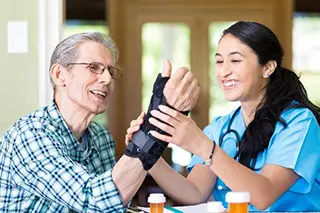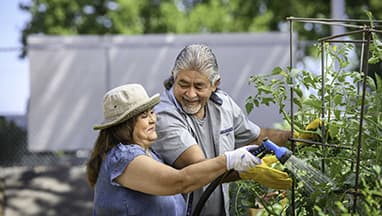Occupational Therapy
Presbyterian’s occupational therapy team can help patients regain or improve their physical function and movement after surgery, following an injury or because of the effects of a chronic illness. Occupational therapists use different types of treatments depending on your specific needs. They work closely with your healthcare provider and other therapy team members to create a personalized rehabilitation plan. Some types of treatments used may include therapeutic exercises, stretches, hands-on therapy, and training in the use of different devices to help with activities of daily living (ADLs). Our team also provides patient education so you can continue to maintain or improve your physical function even after your formal occupational therapy treatment period is over.

Services / Conditions Treated
Some common conditions treated by our occupational therapy team include:
Orthopedic
Arthritis
Hand therapy - all hand, finger, wrist injuries or after surgeries
Joint injuries (finger, hand, wrist, elbow, shoulder)
Joint replacement (finger, hand, wrist, elbow, shoulder)
Muscle weakness
Post-operative rehabilitation (finger, hand, wrist, elbow, shoulder)
Worker’s Compensation injuries
Neurological
Spinal cord injuries
Stroke, cerebrovascular accident (CVA) or transient ischemic attack (TIA)
Traumatic brain injury (TBI)
Other Conditions
Amputation (phantom limb pain, prosthetic training)
Cancer
Lymphedema
Treatments/Tests Performed
Some common treatments performed by our occupational therapy team include:
Adaptive equipment training
Assistance with activities of daily living
Body mechanics, posture and joint protection training
Coordination training
Electrical stimulation/TENS
Heat and cold pack therapy
Improving motor skills, especially fine motor skills and hand-eye coordination
Joint mobilization and manipulation
Kinesiology taping
Laser and light therapy
Therapeutic exercise
Therapeutic ultrasound
Self-care routine planning and assistance
Solid Ground fall prevention training
Splinting for post-op, pain, and deformity
CLINICS & FACILITIES
Occupational Therapy in Albuquerque at the Healthplex Occupational Therapy at Socorro General Hospital Occupational Therapy in Tucumcari at Dr. Dan C. Trigg Memorial Hospital Occupational Therapy in Albuquerque at Kaseman Hospital Occupational Therapy in Clovis at Plains Regional Medical Center Occupational Therapy in Rio Rancho on Southern Blvd Occupational Therapy in Ruidoso at Lincoln County Medical Center Occupational Therapy at Santa Fe Medical Center
Related Services and Programs
Aquatic Therapy Fitness Physical Therapy Orthopedics and Orthopedic Surgery



